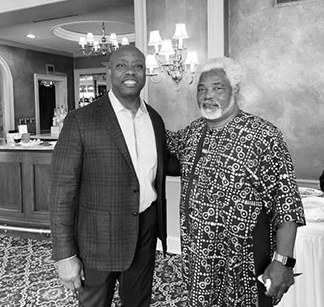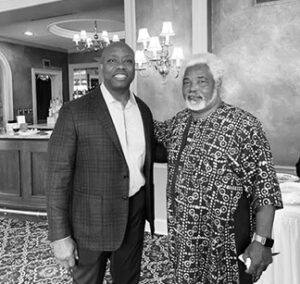Karens
The ‘Old Testament’ politics of GOP presidential candidate, Sen. Tim Scott


In the Republican game of presidential musical chairs, South Carolina Senator Tim Scott is undoubtedly proving to have a rhythmic glide to his stride, even if the African American audience can’t relate because the tune being played is not ‘Old School R&B.’
And since the candidates are striding to alternating polka and country western music, it is all but assured candidate Donald Trump will eventually flop his big butt in the most prominent chair.
Nonetheless, with Trump’s absence necessitated by an appearance for mug shots in Georgia on multiple charges of racketeering, Scott’s two-step has come into focus.
In fact, based on the assessment of several reputable African American pundits, Scott, the African American senator from the first state to succeed from the Union in 1861, took second place among debaters during the first Republican square dance in Milwaukee two weeks ago.
Such luminaries as respected journalist and Sirius talk radio host Karen Hunter posited that Scott came in second behind Nikki Haley, the only woman in the hunt for the GOP nomination, and the former South Carolina governor who knighted Scott to his U.S. senatorial seat a decade ago.
Scott went on to officially win the seat in consecutive elections. However, as Democratic Party shepherds of the Black flock pointed out, he didn’t receive the majority Black vote, which went to a Black Democratic Party candidate.
That’s because Scott is, in my refocused prism of American political scripture, ‘Old Testament.’
For those who haven’t fully grasped 21st century ‘new norm’ politics, the distinction between the two major parties can be simplified by explaining Republicans follow Old Testament covenants on gender roles, crime, and the sanctity of ‘human life’—which they interpret to mean they are pro-life and anti-abortion—while the Democrats are New Testament, liberal thinkers who essentially posit theBible is an evolving document which changes with societal attitudes, political expediency, and cultural conveniences.
Don’t assume I’m blowing smoke or suggesting blasphemous metaphors.
Most Black millennials are unaware that their grandparents were faithful to similar paradigms, including the sanctity of marriage and the ‘sins’ of homosexuality, fornication, murder, and looking white people in the eye.
Believe it or not, those tenets also applied to Democrats before the party reversed its platform in the mid-1960s and decided, like Thomas Jefferson, that scripture didn’t meet their political aspirations and could be rewritten or written out.
That left the GOP as the only hope for maintaining power and embrace conservatism and evangelicals. The party that once championed civil rights restructured its platform to address the issue of nationalism, an unnecessarily ‘strong’ defense posture (strong military) over social welfare; and opposition to nontraditional family structures and—of course—abortion.
Nonetheless, while Scott has been ostracized by Democrats and many African Americans for his ‘political religion’ and support of Donald Trump, he has garnered positive accolades for championing an overhaul of education, which only the politically impotent fail to link to Black America’s array of social ills.
And it was that ‘novel’ political advocacy that sparked my curiosity amidst my dwindling hope for systemic change.
As such, I recently reached out to Black conservative Republican Gerard Randall during the MCJ anniversary fete for an opportunity to connect me with Scott following the recent Republican debate.
His response was an invitation to a closed luncheon with a cadre of local movers and shakers of both hues.
Randall also invited former Wisconsin Governor Tommy Thompson, whose support of several Black-inspired initiatives, including investments in economic development and school choice, garnered him the most significant Black voter turnout in state history, arrived shortly after Scott’s departure.
If Scott comes close to walking in former Governor Thompson’s footsteps, he can fill a notable void in this presidential sweepstakes.
I’ll clarify that point later.
Under an open format, it didn’t take much for me to dominate the Q&A segment, not only because I was the only journalist in the room, but equally because I assume those with lesser melanin were curious as to what an African American ‘independent’ known for my Black Nationalistic philosophy, had to say.
What they witnessed was a lively discussion about the plight of Black America—specifically Milwaukee—highlighted by a lengthy discussion about my single focus political issue: education.
As the only presidential candidate of either party to declare educational reform as a platform priority, Scott’s campaign has evoked my interest, raising above the cloud of controversy related to his highly publicized comments on American racism.
To my inquiries, Scott boldly suggested the route America must take to resolve the cancer of poverty, joblessness, and racism is through the valley of education.
And unless America selects new leadership to address this national calamity immediately, those social ills will multiply as artificial intelligence (AI) stripsmillions from the workforce.
A strong supporter of school choice—educational options—Scott said it was not a cure-all and that systemic reforms must be actualized if America is to address poverty and the myriad issues that are a direct byproduct.
Scott said he sees education through the lens of someone limited by his socioeconomic status, including being raised in a single-parent household. As a product of his environment, he failed most core subjects as a freshman.
He explained an intervention by a mentor redirected his path, which unfortunately is not the case for most urban children facing the obstacles of poverty and substandard education.
As he spoke, Scott’s mother, who traveled the campaign trail with him, provided several nods of approval at various points.
Since we were seated back-to-back, I couldn’t see her face. Still, I assume she had a broad smile, one of pride and the recognition that discipline, provocation, and strong Christian faith can overcome any obstacle, regardless of one’s hue.
She may even have felt isolated and betrayed, as the values and mores she raised her son to believe—including the bromide that neither race nor racism should ever be a barrier, or excuse—has become a mantra for cultural attacks.
She also, no doubt, finds fault with the assumption that there is a template for Blackness.
Scott noted that America spends $770 billion on ‘public’ education, “14% from the feds,” although that underwhelming investment has a large imprint that can sway the failing eduacracy.
A systemic educational overhaul must include a parents’ bill of rights, which he supports because parents are excluded from the educational equation under the current system.
Instead, ‘it is a teacher or bureaucrat who determines what’s best for your children,’ a recipe that frequently ends with excuses for failure.
Poor children, which includes a disproportionate percentage of Black students living in impoverished urban America, are two years behind their middle-class counterparts educationally, a status few will overcome under the current template.
That is not to say urban children do not have similar potential or intelligence, but the system and frequently disengaged or apathetic parents, are failing them, he said.
Scott proudly explained his evolution from a ‘statistic’ to a college graduate, business owner, and senator on the national stage is proof positive of what can be achieved when you don’t allow yourself to be swayed by ‘poverty politics’—the lie that only the exceptional emerge from the pack.
A strong advocate for school choice–which he noted Democrats oppose because of teacher union influence–has proven to be a successful educational option, particularly for the millions in failing public schools.
Milwaukee is a shining example of what can be achieved by empowering parents and opening the doors to successful lives.
“The fact is 20% of the nation’s best schools are charters, outperforming public schools,” he explained.
A more significant percentage of ‘choice students’ have access to Black male teachers, which data reveals enhances student performance by leaps and bounds.
“Seventy percent of Americans support school choice, so we should (provide) parents with those options.”
Echoing statements he’s made in interviews throughout the campaign, he said, “Every parent should have a choice.”
In response to my revelation about Milwaukee’s status as the worst city in the county for African Americans—highest Black incarceration, poverty, male unemployment, and educational achievement rates—Scott said each negative social stats can be traced to poor education.
Among his top priorities, if elected, would be to create an educational template that will equalize the playing field and provide children with the tools to succeed based on their ability and not the color of their skin.
But that educational paradigm will be changed only when the discussion is about what is best for the children instead of what is best for the adults—particularly teachers’ union opposition to systemic reforms.
As I later watched the attendees line up to take photos with the man with a target on his back, I couldn’t help but remember the opening intro of talk show host Ken Harris, which questions why Black folks put all of their eggs in one political basket and then complain when we have no voice at the dinner table.
I don’t know if Tim Scott will be the nominee, as most pundits feel unless there is an alien invasion or criminal conviction, Trump will again face Biden next year.
Even if Trump becomes an ineligible felon, Scott will face Black criticism for his Old Testament philosophy and, more distinctly, his conservative lyrics, including his much-publicized comment that America is not a racist country.
Maybe because I’m politically independent and view both parties as wings on the same bird, I took that statement with a grain of ‘political sea salt.’
Moreover, I cannot ignore that while Democrats and members of the ‘Negrocracy’ call Scott something other than brother precisely because of his opinion, they were silent when Vice President Kamala Harris made a similar statement.
Nor have I heard a Democrat offer a solution to one of the root causes of Black underachievement in America—education. Instead, the party conveniently offers band-aids and wishful thinking as millions of Black Americans slip through the education cracks.
Since, from my vantage point, my vision is often obscured by Black misery, disenchantment, and the ‘de-evolution’ of our tribe, I’ve become so desperate for intervention that I simply don’t care whose hand is throwing us a life preserver.
I’ve long ago surmised our renaissance will not occur as long as we await a political knight or engage in ‘missionary politics.’
Moreover, as my mentor Polly Williams once declared, we have no permanent friends or permanent enemies, only permanent issues.
Scott’s positions on the issues of immigration, systemic racism, the economy, and social welfare may not be in tune with the Black agenda (whatever it is today…wait, what time is it now?). Still, he is the only candidate speaking Ebonics on the civil rights battleground of education.
Hotep.


Read the full article here













You must be logged in to post a comment Login